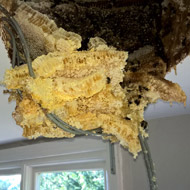
Hundreds of bees found in listed building
An enormous bee hive has been removed from a loft after a couple spotted honey dripping through their bathroom ceiling.
The hive was found in a grade II listed 18th Century house in Leicestershire earlier this month.
The couple told BBC News that they found the “sticky substance” coming through a light fixture. But it was not until heritage insurer Ecclesiastical cut a hole in the ceiling that they made the “surprising” discovery.
“The couple noticed a patch [and] on closer inspection they could see that the substance was sticky and coming through the light fixtures, said an Ecclesiastical spokesperson. "They [also] noticed a lot of bees around the house and at this point sought an expert view. The bee expert made a hole in the ceiling and discovered the huge hive."
The insurer added that because of the amount of honey, the claim had to be made in a similar way to water damage. After the busy bees and their honeycomb were removed, the ceiling and light fixtures were repaired.
David Bonehill, claims director at Ecclesiastical said: "Claims for this type of damage in older properties are relatively common. Usually leaking pipework is the cause rather than honey!"
Image (C) Ecclesiastical



 The RCVS has announced a new version of its 1CPD mobile app, with enhanced features for veterinary surgeons and veterinary nurses to record their continuing professional development.
The RCVS has announced a new version of its 1CPD mobile app, with enhanced features for veterinary surgeons and veterinary nurses to record their continuing professional development.